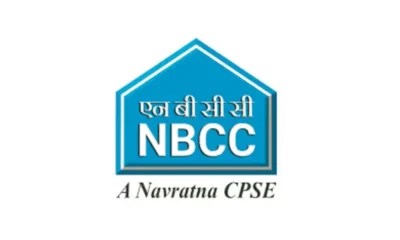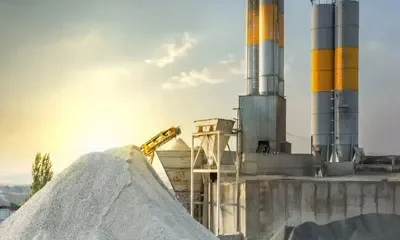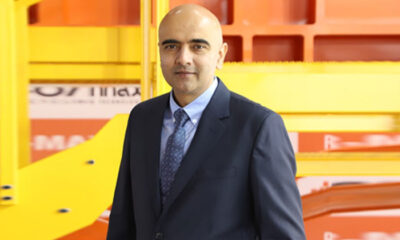Economy & Market
Gunning for lower downtime
Published
7 years agoon
By
admin
For minimising downtime, techniques like gunning and shotcreting are being adopted, instead of using pre-fired bricks in refractories.
Portland cement manufacturing is an energy intensive operation, and a refractory lining that can withstand high temperatures, alkalinity and corrosive conditions is absolutely essential.
Refractories play a critical role in both the rotary kiln lining, and the lining of the high volume static equipment areas that comprise a modern pre-calciner kiln system. The refractory kiln process involves pyro-processing of raw material, and extremely high temperature in rotary kilns. Often the kiln feeds are alkaline in nature, generate corrosive reactants. Hence the importance of refractories with strong resistance to such characteristics and having robust thermal efficiencies in cement manufacturing. ‘After two years of depressed market, currently refractory market has stabilised a bit and it seems that recovery is underway in 2018,’ says Ish Mohan Garg, Managing Director, Calderys.
While iron and steel industry is the major consumer of refractories with 65-75 per cent share, cement is the second major consumer of the equipment with 10-15 per cent share of total refractory consumed, followed by glass, non-ferrous metals, petrochemicals and hydrocarbons, which also involve high temperature processes.
Imports
About 30 per cent of refractories consumed in India is imported, mostly from China. ‘The primary driver for these imports is the abundant availability of raw material there, especially magnesite. To that extent, we cannot wish away the role of China and this is also the reason why refractory companies have set up plants in China,’ says Sameer Nagpal, CEO, Dalmia-OCL. However, the recent raw material crisis in China provides immense opportunity for India to bolster its domestic refractory industry by allowing it to source and secure raw materials from other countries with zero import duty.
But, certain policy anomalies have to be corrected to achieve this, says Garg. ‘Refractory is essentially a "Make in India" business model where we import raw materials and create value-added products in India. But while import duty on raw material is 5 per cent, that on finished product is 2.5 per cent. This import duty has to be increased to encourage domestic manufacturing activity.’
With India becoming the world’s second largest steel and cement producer, it should also be a leading refractory producer to support these industries. ‘Indian companies have the wherewithal to emerge as a globally competitive player and we are actively pursuing this direction. We are looking at acquisitions in Europe that can help us build scale and access latest technologies,’ says Nagpal.
‘Due to its low-cost and highly skilled workforce, India is a competitive market for refractory manufacturing and is also a sourcing base for Americas and Europe,’ Nagpal adds. Dalmia-OCL has a network spread across different countries and exports constitute 15 per cent of its revenue.
However, Garg differs on competitiveness of the Indian refractory industry. ‘Raw materials being 60-70 per cent of the total cost of refractory makes it difficult for Indian refractory industry to become globally competitive, due to sheer dependence of Indian manufacturers on imported raw materials. As a country, our ability to tap into global/ regional market is very much restricted,’ he points out.
Technology
As cement demand picks up and capacity utilisation goes up, cement manufacturers may want to minimise the downtime for replacing refractory lining. ‘This is giving rise to demand for higher performing bricks with higher life and shorter application time. Techniques like gunning and shotcreting using monolithic refractory, which is in powder form and takes shape after being applied, instead of using pre-fired bricks, is also gaining currency,’ says Nagpal.
Dalmia-OCL has formed a joint venture with a leading European refractory company for bringing to India the latest in gunning and shotcreting products, and is setting up the most modern monolithic plant in Katni, Madhya Pradesh.
Also, Indian cement makers use a lot of alternative fuels, which puts tremendous thermochemical pressure on refractory. Hence second or third generation spinels, hybrid refractories are coming up to take care of the increased thermochemical loads. Another trend is the effort towards reduction of thermal losses by introducing energy-saving refractories. New concepts are also coming up on thermal insulation of pyro system.
In the past, the major focus had been on the kiln performance, primarily productivity but with stricter environmental norm there has been major shift on the cement kiln system refractories too. ‘Well known hexavalent chrome problem associated with Mag Chrome refractories has made them unusable in cement kiln. In the kiln burning zone, Mag Chrome bricks have been substituted by wide range of alternate spinel products, e.g. MagAl, Hercenyte and others like zirconia containing magnesia, etc.,’ says Garg of Calderys.
Ammonia injection, once stricter NOx and SOx norms is implemented, would put significantly more stress on the refractory in the cement kiln system. Refractory manufacturers need to gear up for these upcoming regulatory norms.
Cement kilns in India are virtually being used as incinerator, where pharma and municipal wastes are common feed as fuel. This obviously has changed the kiln operating environment. This has resulted in increased coating build in kiln inlet as well as Spurrite ring formation within the kiln. On many occasions, the clinker is dustier compared to the past. ‘These changes obviously have called for refractories with different features. Incorporation of the requisite features has turned out to be much easier in monolithic, primarily castables, compared to bricks. Against this backdrop, castable in kiln inlet, tip casting, bull nose and cooler bench has become a standard practice. With the advent of shotcrete installation process, for identical castable formulations, faster installation extension of refractory life, by repair, has been possible,’ says Garg.
Boost domestic manufacturing
While emphasising the need to boost local refractory manufacturing, Nagpal of Dalmia-OCL suggested reduction of duties on raw material import; enabling mining policies for minor minerals like bauxite, quartzite, magnesite, etc., which are critical refractory raw materials, to reduce dependence on external sources; and support to refractory and ceramics R&D to boost local innovation, for this purpose.
The primary support from government should be on the following three fronts – ‘technology development, developing young talent and sustainability,’ says Garg of Calderys.
On behalf of IRMA, Calderys has set up Centre of Excellence at IIT BHU aimed at technological advances for making industry globally competitive. ‘We need to accelerate such advances in multiple Institute of repute,’ Garg adds.
For decades, the industry has been dumping used refractory in landfills, however, more sustainable way is to extract key raw materials from the same, use it again for refractory. ‘We trust Government should work with user industry to enable reverse supply chain of used refractory,’ says Garg.
-BS SRINIVASALU REDDY
Concrete
FORNNAX Appoints Dieter Jerschl as Sales Partner for Central Europe
Published
2 weeks agoon
February 5, 2026By
admin
FORNNAX TECHNOLOGY has appointed industry veteran Dieter Jerschl as its new sales partner in Germany to strengthen its presence across Central Europe. The partnership aims to accelerate the adoption of FORNNAX’s high-capacity, sustainable recycling solutions while building long-term regional capabilities.
FORNNAX TECHNOLOGY, one of the leading advanced recycling equipment manufacturers, has announced the appointment of a new sales partner in Germany as part of its strategic expansion into Central Europe. The company has entered into a collaborative agreement with Mr. Dieter Jerschl, a seasoned industry professional with over 20 years of experience in the shredding and recycling sector, to represent and promote FORNNAX’s solutions across key European markets.
Mr. Jerschl brings extensive expertise from his work with renowned companies such as BHS, Eldan, Vecoplan, and others. Over the course of his career, he has successfully led the deployment of both single machines and complete turnkey installations for a wide range of applications, including tyre recycling, cable recycling, municipal solid waste, e-waste, and industrial waste processing.
Speaking about the partnership, Mr. Jerschl said,
“I’ve known FORNNAX for over a decade and have followed their growth closely. What attracted me to this collaboration is their state-of-the-art & high-capacity technology, it is powerful, sustainable, and economically viable. There is great potential to introduce FORNNAX’s innovative systems to more markets across Europe, and I am excited to be part of that journey.”
The partnership will primarily focus on Central Europe, including Germany, Austria, and neighbouring countries, with the flexibility to extend the geographical scope based on project requirements and mutual agreement. The collaboration is structured to evolve over time, with performance-driven expansion and ongoing strategic discussions with FORNNAX’s management. The immediate priority is to build a strong project pipeline and enhance FORNNAX’s brand presence across the region.
FORNNAX’s portfolio of high-performance shredding and pre-processing solutions is well aligned with Europe’s growing demand for sustainable and efficient waste treatment technologies. By partnering with Mr. Jerschl—who brings deep market insight and established industry relationships—FORNNAX aims to accelerate adoption of its solutions and participate in upcoming recycling projects across the region.
As part of the partnership, Mr. Jerschl will also deliver value-added services, including equipment installation, maintenance, and spare parts support through a dedicated technical team. This local service capability is expected to ensure faster project execution, minimise downtime, and enhance overall customer experience.
Commenting on the long-term vision, Mr. Jerschl added,
“We are committed to increasing market awareness and establishing new reference projects across the region. My goal is not only to generate business but to lay the foundation for long-term growth. Ideally, we aim to establish a dedicated FORNNAX legal entity or operational site in Germany over the next five to ten years.”
For FORNNAX, this partnership aligns closely with its global strategy of expanding into key markets through strong regional representation. The company believes that local partnerships are critical for navigating complex market dynamics and delivering solutions tailored to region-specific waste management challenges.
“We see tremendous potential in the Central European market,” said Mr. Jignesh Kundaria, Director and CEO of FORNNAX.
“Partnering with someone as experienced and well-established as Mr. Jerschl gives us a strong foothold and allows us to better serve our customers. This marks a major milestone in our efforts to promote reliable, efficient and future-ready recycling solutions globally,” he added.
This collaboration further strengthens FORNNAX’s commitment to environmental stewardship, innovation, and sustainable waste management, supporting the transition toward a greener and more circular future.
Concrete
Budget 2026–27 infra thrust and CCUS outlay to lift cement sector outlook
Published
2 weeks agoon
February 2, 2026By
admin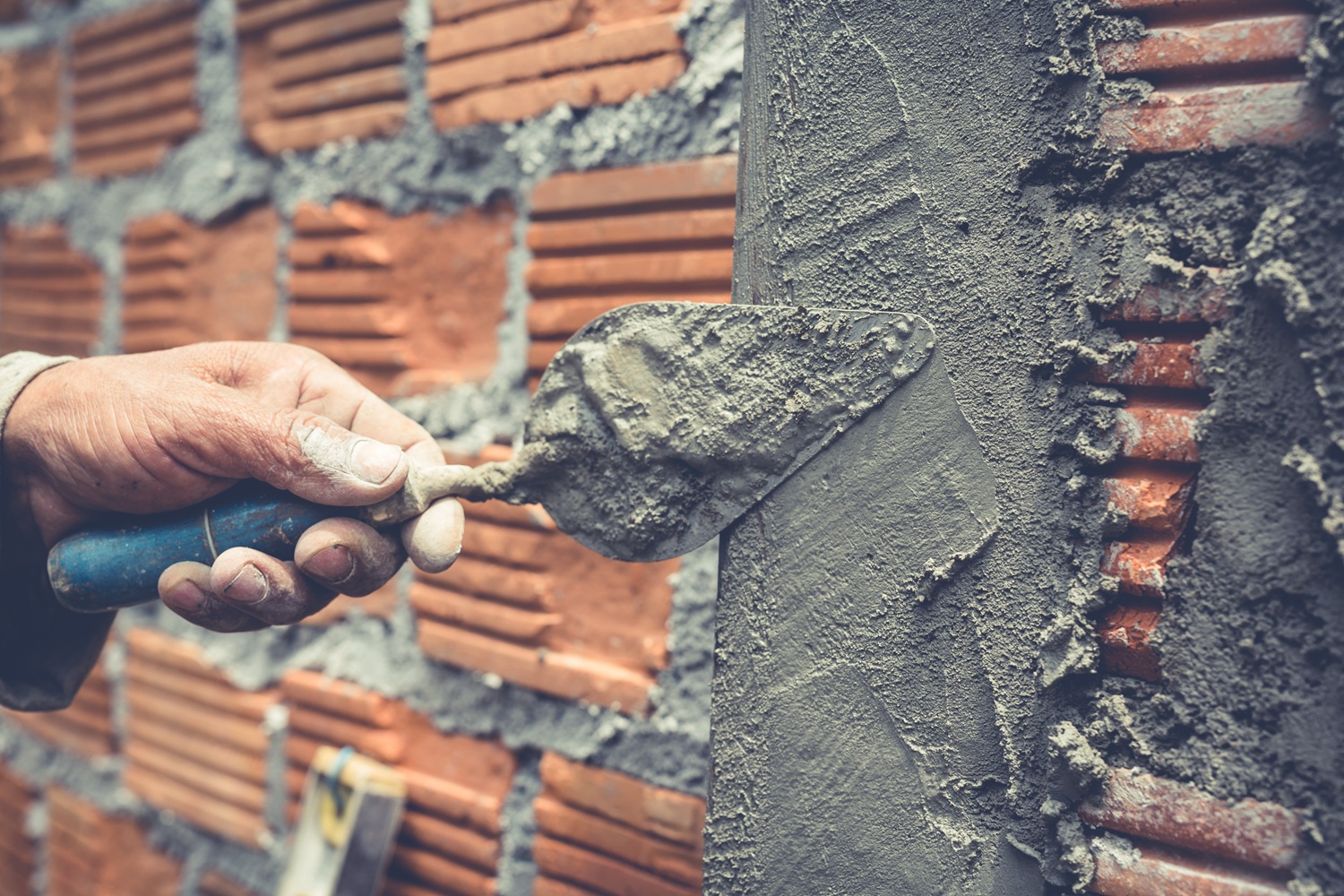
Higher capex, city-led growth and CCUS funding improve demand visibility and decarbonisation prospects for cement
Mumbai
Cement manufacturers have welcomed the Union Budget 2026–27’s strong infrastructure thrust, with public capital expenditure increased to Rs 12.2 trillion, saying it reinforces infrastructure as the central engine of economic growth and strengthens medium-term prospects for the cement sector. In a statement, the Cement Manufacturers’ Association (CMA) has welcomed the Union budget 2026-27 for reinforcing the ambitions for the nation’s growth balancing the aspirations of the people through inclusivity inspired by the vision of Narendra Modi, Prime Minister of India, for a Viksit Bharat by 2047 and Atmanirbharta.
The budget underscores India’s steady economic trajectory over the past 12 years, marked by fiscal discipline, sustained growth and moderate inflation, and offers strong demand visibility for infrastructure linked sectors such as cement.
The Budget’s strong infrastructure push, with public capital expenditure rising from Rs 11.2 trillion in fiscal year 2025–26 to Rs 12.2 trillion in fiscal year 2026–27, recognises infrastructure as the primary anchor for economic growth creating positive prospects for the Indian cement industry and improving long term visibility for the cement sector. The emphasis on Tier 2 and Tier 3 cities with populations above 5 lakh and the creation of City Economic Regions (CERs) with an allocation of Rs 50 billion per CER over five years, should accelerate construction activity across housing, transport and urban services, supporting broad based cement consumption.
Logistics and connectivity measures announced in the budget are particularly significant for the cement industry. The announcement of new dedicated freight corridors, the operationalisation of 20 additional National Waterways over the next five years, the launch of the Coastal Cargo Promotion Scheme to raise the modal share of waterways and coastal shipping from 6 per cent to 12 per cent by 2047, and the development of ship repair ecosystems should enhance multimodal freight efficiency, reduce logistics costs and improve the sector’s carbon footprint. The announcement of seven high speed rail corridors as growth corridors can be expected to further stimulate regional development and construction demand.
Commenting on the budget, Parth Jindal, President, Cement Manufacturers’ Association (CMA), said, “As India advances towards a Viksit Bharat, the three kartavya articulated in the Union Budget provide a clear context for the Nation’s growth and aspirations, combining economic momentum with capacity building and inclusive progress. The Cement Manufacturers’ Association (CMA) appreciates the Union Budget 2026-27 for the continued emphasis on manufacturing competitiveness, urban development and infrastructure modernisation, supported by over 350 reforms spanning GST simplification, labour codes, quality control rationalisation and coordinated deregulation with States. These reforms, alongside the Budget’s focus on Youth Power and domestic manufacturing capacity under Atmanirbharta, stand to strengthen the investment environment for capital intensive sectors such as Cement. The Union Budget 2026-27 reflects the Government’s focus on infrastructure led development emerging as a structural pillar of India’s growth strategy.”
He added, “The Rs 200 billion CCUS outlay for various sectors, including Cement, fundamentally alters the decarbonisation landscape for India’s emissions intensive industries. CCUS is a significant enabler for large scale decarbonisation of industries such as Cement and this intervention directly addresses the technology and cost requirements of the Cement sector in context. The Cement Industry, fully aligned with the Government of India’s Net Zero commitment by 2070, views this support as critical to enabling the adoption and scale up of CCUS technologies while continuing to meet the Country’s long term infrastructure needs.”
Dr Raghavpat Singhania, Vice President, CMA, said, “The government’s sustained infrastructure push supports employment, regional development and stronger local supply chains. Cement manufacturing clusters act as economic anchors across regions, generating livelihoods in construction, logistics and allied sectors. The budget’s focus on inclusive growth, execution and system level enablers creates a supportive environment for responsible and efficient expansion offering opportunities for economic growth and lending momentum to the cement sector. The increase in public capex to Rs 12.2 trillion, the focus on Tier 2 and Tier 3 cities, and the creation of City Economic Regions stand to strengthen the growth of the cement sector. We welcome the budget’s emphasis on tourism, cultural and social infrastructure, which should broaden construction activity across regions. Investments in tourism facilities, heritage and Buddhist circuits, regional connectivity in Purvodaya and North Eastern States, and the strengthening of emergency and trauma care infrastructure in district hospitals reinforce the cement sector’s role in enabling inclusive growth.”
CMA also noted the Government’s continued commitment to fiscal discipline, with the fiscal deficit estimated at 4.3 per cent of GDP in FY27, reinforcing macroeconomic stability and investor confidence.
Concrete
JK Cement Crosses 31 MTPA Capacity with Commissioning of Buxar Plant in Bihar
Published
3 weeks agoon
January 30, 2026By
admin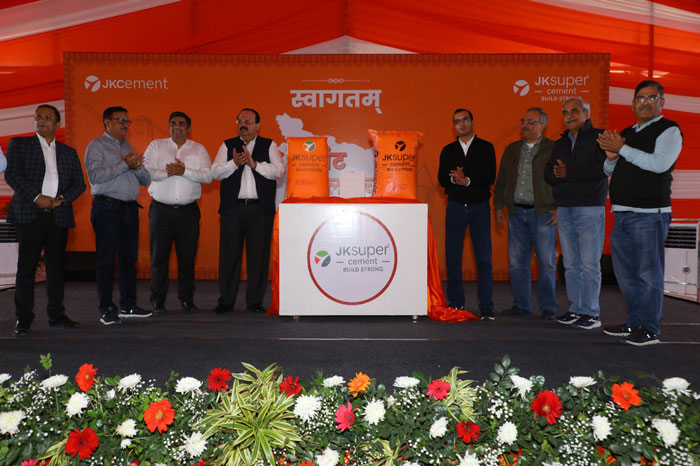
JK Cement has commissioned a 3 MTPA Grey Cement plant in Buxar, Bihar, taking its total capacity to 31.26 MTPA and placing it among India’s top five grey cement producers. The ₹500 crore investment strengthens the company’s national footprint while supporting Bihar’s infrastructure growth and local economic development.
JK Cement Ltd., one of India’s leading cement manufacturers, has announced the commissioning of its new state-of-the-art Grey Cement plant in Buxar, Bihar, marking a significant milestone in the company’s growth trajectory. With the commissioning of this facility, JK Cement’s total production capacity has increased to 31.26 million tonnes per annum (MTPA), enabling the company to cross the 30 MTPA threshold.
This expansion positions JK Cement among the top five Grey Cement manufacturers in India, strengthening its national footprint and reinforcing its long-term growth strategy.
Commenting on the strategic achievement, Dr Raghavpat Singhania, Managing Director, JK Cement, said, “Crossing 31 MTPA is a significant turning point in JK Cement’s expansion and demonstrates the scale, resilience, and aspirations of our company. In addition to making a significant contribution to Bihar’s development vision, the commissioning of our Buxar plant represents a strategic step towards expanding our national footprint. We are committed to developing top-notch manufacturing capabilities that boost India’s infrastructure development and generate long-term benefits for local communities.”
The Buxar plant has a capacity of 3 MTPA and is spread across 100 acres. Strategically located on the Patna–Buxar highway, the facility enables faster and more efficient distribution across Bihar and adjoining regions. While JK Cement entered the Bihar market last year through supplies from its Prayagraj plant, the Buxar facility will now allow the company to serve the state locally, with deliveries possible within 24 hours across Bihar.
Sharing his views on the expansion, Madhavkrishna Singhania, Joint Managing Director & CEO, JK Cement, said, “JK Cement is now among India’s top five producers of grey cement after the Buxar plant commissioning. Our capacity to serve Bihar locally, more effectively, and on a larger scale is strengthened by this facility. Although we had already entered the Bihar market last year using Prayagraj supplies, local manufacturing now enables us to be nearer to our clients and significantly raise service standards throughout the state. Buxar places us at the center of this chance to promote sustainable growth for both the company and the region in Bihar, a high-growth market with strong infrastructure momentum.”
The new facility represents a strategic step in supporting Bihar’s development vision by ensuring faster access to superior quality cement for infrastructure, housing, and commercial projects. JK Cement has invested approximately ₹500 crore in the project. Construction began in March 2025, and commercial production commenced on January 29, 2026.
In addition to strengthening JK Cement’s regional presence, the Buxar plant is expected to generate significant direct and indirect employment opportunities and attract ancillary industries, thereby contributing to the local economy and the broader industrial ecosystem.

FORNNAX Appoints Dieter Jerschl as Sales Partner for Central Europe

Budget 2026–27 infra thrust and CCUS outlay to lift cement sector outlook

Steel: Shielded or Strengthened?

JK Cement Commissions 3 MTPA Buxar Plant, Crosses 31 MTPA

JK Cement Crosses 31 MTPA Capacity with Commissioning of Buxar Plant in Bihar

FORNNAX Appoints Dieter Jerschl as Sales Partner for Central Europe

Budget 2026–27 infra thrust and CCUS outlay to lift cement sector outlook

Steel: Shielded or Strengthened?

JK Cement Commissions 3 MTPA Buxar Plant, Crosses 31 MTPA

















